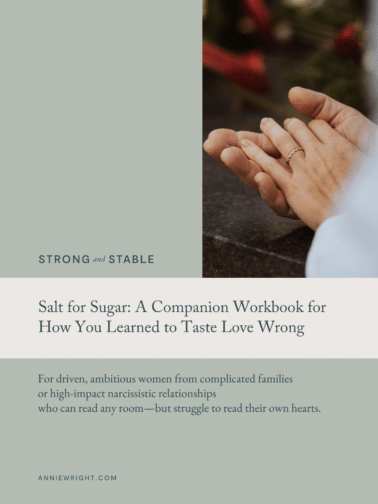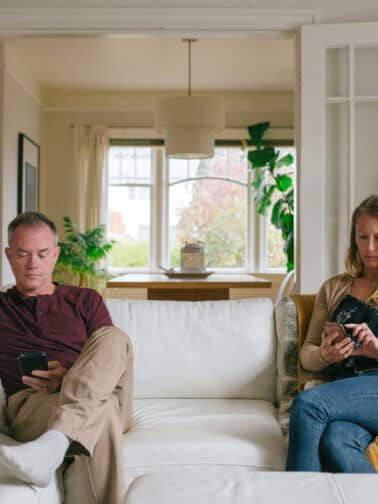TL;DR –Judith Lewis Herman's observation that trauma survivors shouldn't be robbed of their adulthoods after already losing their childhoods captures a crucial truth: recovery isn't just about healing the past but actively creating the beautiful adult life you deserve. Creating a beautiful adulthood means matching your insides to your outsides—aligning where you live, what you do, who you're with, and how you use your resources with what your soul actually hungers for, rather than living from trauma-driven patterns of overwork, people-pleasing, or self-denial. This isn't a final step that begins after healing is "complete" but something woven throughout recovery work as you simultaneously grieve the past, build missing skills, seek reparative experiences, and make increasingly conscious choices about your present life.
The work involves recognizing where trauma impacts still rule you—the woman working 80-hour weeks despite financial security because poverty taught her she's never safe enough, the man hiding his sexuality because childhood conditioning says who he is isn't acceptable, the adult maintaining contact with abusive family because they don't know they have choices. While acknowledging that redesigning life to match inner truth is a privilege not everyone can access (especially those still dependent on dysfunctional systems for survival), the goal remains helping you develop agency and responsiveness rather than reactivity, so your beautiful adulthood reflects your authentic desires rather than your traumatic adaptations.
In an online training I took recently, the teacher mentioned having overheard the famed American psychiatrist, researcher, and author Judith Lewis Hermann, MD in the halls of her training clinic in Massachusetts say that (and I paraphrase), “It’s very sad that our patients got robbed of their childhoods. It would be a tragedy if they were robbed of their adulthood, too.”
It’s a sentiment that precisely captures what I consider an integral step and stage of relational trauma recovery work: moving forward to create a beautiful adulthood for yourself despite adverse early beginnings.
But what, precisely, does it actually mean to create a beautiful adulthood for yourself? And do you need to be “fully healed” in order to achieve this? At what point does the recovery work from childhood trauma end and the pursuit of building a better adulthood begin?
What does it mean to create a beautiful adulthood for yourself?
The four pillars that ground my relational trauma recovery work are psychoeducation, skills-building, grieving and processing, and reparative relational experiences.
And the goal of each of these steps is to help individuals who came from adverse early beginnings heal, make sense of, and psychologically and physiologically integrate their pasts so that they can move forward and build a beautiful adulthood for themselves.
Each of these cornerstone elements of my work contributes to this one larger mission.
Building a beautiful adulthood is both the end goal and culmination of relational trauma recovery work. But it doesn’t begin when the “healing work” is done.
It literally happens as we’re doing the healing work to face and grieve the past. Throughout our attempts to develop the skills to meet any developmental gaps we missed. And integrally connected to our attempts to seek out and be influenced by reparative relational experiences. And so forth.
Building a beautiful adulthood is not the last step; it’s woven into every step along the way.
Building a beautiful adulthood for yourself is the second chance you give yourself after a less-than-ideal and powerless childhood.
But what does it mean to create a beautiful adulthood for yourself?
In my personal and professional experience, this means, as much as possible, matching your insides to the outside world.
It means, as much as possible, matching what you truly desire. And what suits your soul when it comes to the big externals of our life. Where (home, community, place), What (career, hobbies, life endeavors), Who (relationships – with ourselves and others), and How (money, time).
Giving yourself a beautiful adulthood also means, in my personal and professional experience, not only identifying what you hunger for on the inside but also working through and psychological and physiological trauma impacts that may – consciously or unconsciously – still be ruling you and leading to a disconnect between what you hunger for on the inside and what exists on the outside.
Such trauma impacts may include maladaptive beliefs and behaviors (addictions, compulsions, chronic self-, and other-criticism), a dysregulated nervous system (hyper- or hypo-aroused), attachment wounds (disorganized, anxious, or avoidant attachment patterning), and so much more.
So as you move through relational trauma recovery work, the task is to help better understand what you long for and hunger for and also to help you cultivate more choice and develop more agency so that you can be responsive rather than reactive in your life.
Curious if you come from a relational trauma background?
Take this 5-minute, 25-question quiz to find out — and learn what to do next if you do.
START THE QUIZFor example, this might look like:
- Helping a woman who experienced poverty in her childhood recognize that she’s logistically and financially safe now and helping her nervous system understand that she doesn’t have to work 80+ hour workweeks to feel safe at the cost of driving her autoimmune system into the ground. Helping her see that she has a choice and that the past is past now.
- Helping a young man who grew up in a family and church community that decries homosexuality to feel psychologically and logistically empowered enough to own his own sexuality and to actively seek out community that can validate and honor who he truly is. Helping him understand, assert, and live out who he truly is despite the introjects he may have absorbed.
- Helping a young woman who feels belittled, shamed, and hated each time she has contact with her family-of-origin to know that she has a choice about being in contact with them, and helping her develop the communication and boundary-asserting skills necessary to protect herself when and if she’s in contact with these people. Helping her see that there are choices and helping her act on the choice that feels right for her.
- Helping a young person understand that, unlike what their family modeled for them, healthy, functional relationships are possible and helping them develop more rooted-in-reality beliefs about dating, conflict resolution, and intimacy. Helping re-educate and re-learn foundational relationship principles.
And these are just four of the four thousand examples I could list.
This is what it might look like to match your insides to your outsides in an attempt to give yourself a beautiful adulthood so that you can be responsive versus reactive in life, still ruled by trauma impacts from your past.
But I would be remiss if, in this essay, I didn’t acknowledge that being able to design a life that matches on the outside what you feel on the inside is a huge privilege.
It’s a huge privilege not everyone has – I’m specifically thinking about those who still live inside family, social, or cultural systems that deny the full spectrum of their humanity and where they are still financially, logistically, or even physically dependent on these people and communities for survival.
It is a gift and a privilege to be able to do our personal work and cultivate choices that help match our insides to our outsides and I’m fully aware that not everyone has this privilege or, alternatively, that they have a more limited range of choices and options about what they can and can’t do to create beautiful adulthoods for themselves.
So if you are reading this essay and find yourself in a family, community, or culture where your survival still hinges on fitting in with that system, please know that I see you and understand that the prompts I list below may not feel fully possible for you to consider (yet).
Prompts to consider as you work to create a beautiful adulthood for yourself:
- In reading this essay, do you feel like you have a life that, on the outside, mostly matches your insides?
- If not, in what ways is that disconnect still showing up? Remember what I outlined above with the big externals of our life:
- Where (home, community, place): in what ways might there possibly be disconnects?
- What (career, hobbies, life endeavors): is there any aspect that feels incongruous here?
- Who (relationships – with ourselves and others): is there any way with anyone (including yourself) you can feel the impacts of your past possibly getting in your way?
- And How (money, time): what stories, introjects, or maladaptive beliefs might you still be holding onto that don’t match what you would like to see in this area?
- Ask yourself how, if at all, are you possibly recreating your past in your present? (For example, pushing too hard when you don’t have to like your overbearing, hypercritical parent pushed you? Still holding onto a story that all men are cheaters and holding generalized anger with your faithful partner when you don’t have to?)
- Where do you feel like you don’t have a choice? (For example: feeling like you HAVE to work 6 days a week and take time from your family and that you’ll end in financial ruin if you slow down.)
- And if you’re not even sure what your insides want at all, let me ask you these other prompts:
- What is your soul longing for? What psychological, physiological, and logistical hungers do you have?
- What currently delights you (or did in the past?)
- Whose life do you admire and wish you could emulate more? There are always kernels of information for us when we find ourselves jealous of others.
Building Your Beautiful Adulthood Through Integration-Focused Trauma Therapy
When you tell your therapist you’re exhausted from working 70-hour weeks despite having six months of expenses saved, describing how your body stays braced for poverty that ended fifteen years ago, you’re identifying exactly why understanding what successful recovery from your childhood trauma looks like requires more than just healing past wounds—it demands actively dismantling the trauma-driven patterns still governing your present choices.
Your trauma-informed therapist helps you recognize that building a beautiful adulthood isn’t something you do after recovery but throughout it—each session where you question whether you “have to” maintain contact with critical family, explore why you choose partners who replicate childhood chaos, or examine your inability to rest despite financial security is simultaneously healing work and life-building work. The goal isn’t to wait until you’re “fixed” to start living but to create increasingly conscious choices as you heal.
The therapeutic process involves mapping disconnects between your inner truth and outer life—where trauma still rules through overwork that mirrors childhood chaos, relationships that recreate familiar dysfunction, or life choices based on outdated survival strategies. Your therapist helps you distinguish between “I can’t” (genuine limitations) and “I believe I can’t” (internalized restrictions), developing agency where trauma taught you powerlessness.
Together, you practice “behavioral experiments”—small tests of creating the life you want. Maybe it’s working one less day despite catastrophic fears, setting a boundary with family despite guilt, or pursuing a creative dream despite internal criticism. Each experiment provides data: the world doesn’t end when you choose yourself, your worth isn’t tied to productivity, love doesn’t require self-abandonment.
Most powerfully, therapy helps you grieve not just your lost childhood but also the adult years spent living from trauma rather than truth. This grief, paradoxically, frees you to stop recreating the past and start creating the beautiful adulthood that trauma tried to steal—matching your outsides to your insides one conscious choice at a time.
Wrapping Up
And now I would love to hear from you in the comments below if you feel comfortable sharing:
What is one major way you personally matched your insides up to your outsides in order to create a beautiful adulthood for yourself? And what, perhaps, is one way you could make more movement towards creating a beautiful adulthood for yourself?
If you feel so inclined, please leave a comment below so our community of 20,000+ monthly blog readers can benefit from your wisdom.
Here’s to healing relational trauma and creating thriving lives on solid foundations.
Warmly,
Annie
Resources and further reading to spark inspiration about how to create a beautiful adulthood for yourself:
- Women Who Run With The Wolves: Myths and Stories of the Wild Woman Archetype by Clarissa Pinkola Estes, PhD *
- Untamed by Glennon Doyle *
- Year of Yes: How to Dance it Out, Stand in the Sun, And Be Your Own Person by Shonda Rhimes *
- What is the shape of missing things in your life?
- Don’t know if you want to have children? This blog post is for you.
- What kind of career do you want anyways?
- Your dreams have messages for you. But do you know how to unlock them?
* This is an affiliate link and any purchases made through this link will result in a small commission for me (at no extra cost for you).





